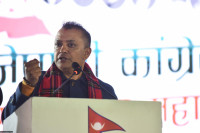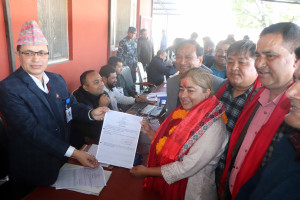Opinion
Trading up
Addressing supply-side constraints are the major challenges for Nepal’s international trade
Delegations from all 162 member countries, 22 observer states, representatives of different intergovernmental organisations, accredited NGOs, and media, among others, participated in the Tenth World Trade Organisation (WTO) Ministerial Conference (MC 10)
that took place, successfully, in Nairobi, Kenya in December. This was the first
MC of the WTO in Africa and was inaugurated by Uhuru Kenyatta, President of the Republic of Kenya.
The Nepali delegation participated in the meetings of the trade ministers of Least Developed Countries (LDC) and Landlocked Developing Countries (LLDC), and held bilateral meetings with three neighbouring countries—India, China and Bangladesh. During the bilateral and other events, Nepal put forward the issue of the present obstruction on supplies, post-quake reconstruction and rehabilitation initiatives.
Nairobi package
Viewing from the perspective of the LDCs, the outcome of the MC 10, also known as the ‘Nairobi package’, seems mediocre as it fails to address some of their major concerns. The Nairobi Package contains a series of six ministerial decisions on agriculture, cotton and issues related to LDCs. These include: commitment to abolish export subsidies for farm exports, known as export competition, public stockholding for food security purposes, a special safeguard mechanism for developing countries, measures related to cotton, preferential treatment for LDCs in the area of services and preferential rules of origin. Out of these six outcomes, agreement on abolishing export subsidies for farm exports has been taken as the centerpiece of the Nairobi Package, which Director-General of the WTO, Mr. Roberto Azevêdo, termed as the “most significant outcome on agriculture” in the 20-year history of the organisation.
Under the decision of export competition, the developed members have committed to remove export subsidies immediately, except for a handful of agriculture products, and the developing countries will do so by 2018. Regarding the public stockholding for food security purposes, the MC 10 allowed to continue food stockpile programmes until a permanent solution is found by the 11th Ministerial Conference in 2017. Similarly, under the special safeguard mechanism, the developing countries and LDCs are allowed to raise tariffs temporarily, if imports increase unexpectedly and domestic industries are hampered badly.
Similarly, acknowledging the longstanding demand of the African cotton-producing countries to eliminate cotton subsidies, the decision came in their favour on the three pillars of market access, domestic support and export competition. Under market access, the cotton products of the LDCs are given duty-free and quota-free (DFQF) access to the markets of the developed countries.
The decision on preferential rules of origin clearly states that when applying an ad valorem percentage criterion, the LDCs are allowed to use non-originating materials up to 75 percent of the final value of the product, which means only 25 percent value addition are acceptable. Moreover, the decision has provided four possibilities of cumulating for value addition, such as, cumulating with the respective preference-granting member, cumulating with other LDCs, cumulating with GSP beneficiaries of the respective preference-granting member and cumulating with developing countries of a regional group.
On the Preferential Treatment in favour of Services and Service Suppliers of LDCs, also known as LDC Services Waiver, the MC 10 extends the current waiver period of 15 years, until 31st December 2030. The waiver allows WTO members to deviate from the most favored nation obligation under the General Agreement on Trade in Services. Moreover, the decision also instructs the Trade in Services Council of the WTO to encourage discussions among members to provide technical assistance to the LDCs aimed at enhancing the capacity of the LDCs in services trade.
Despite these achievements, the MC 10 was unable to build consensus on special and differential treatment proposal submitted by the G-90, an alliance of the LDCs, the African Caribbean and Pacific group and the African Union group.
Nepal’s case
However, Nepal could reap some benefits from the Nairobi package. Because of the four types of cumulation opportunities for the value addition purposes, under the preferential Rules of Origin provision, the export performance of Nepal could be enhanced. Several cases in different countries have proved that the DFQF market access for LDCs can be effectively utilised if it is accompanied by simple and transparent rules of origin. Elimination of export subsidies by the developed and developing countries may have positive impact on export performance of the LDCs, including Nepal, as the products of the LDCs are unable to compete with the subsidised products of the developed countries. Moreover, the LDCs are not in a condition to provide subsidy for their agricultural products. Nepal could also benefit from the extended period of utilisation of services waiver offers and proposed provision of technical assistance, since it has enormous potential in the service sector, including IT and tourism sectors among others. But most importantly, Nepal could increase tariff temporarily if domestic industries are hampered because of an import surge. This situation could lead to an increment in revenue and industrialisation.
Despite several opportunities available under the Nairobi Package, addressing supply-side constraints are the major challenges for Nepal’s international trade. The major constraints in this respect are poor situation of trade related infrastructure, low level of production and productivity, insufficient testing labs including modern and multifunctional ones, low capacity to address Sanitary and Phyto-Sanitary (SPS) and Technical Barriers to Trade (TBT) related issues, institutional and human capacity limitations and so on. Primitive level of entrepreneurship, poor linkage between goods and services including participation in the global value chains, and weak coordination between and among the public institutions and business community are additional hurdles. Moreover, negligence on acknowledging the crucial role of a strong trade ministry and technical competency of human resources involved in international trade is one of the main reasons why the country has not reaped as many benefits from WTO membership as have other LDCs.
Thus, to materialise the opportunities mentioned above, public-private dialogue has to be strengthened further to explore and capitalise on the cumulating opportunities under the preferential rules of origin in the areas of the products, processes and partners, to discover the areas to integrate Nepali industries into the global value chains in both goods and services, and to assess the areas of service trade that have comparative and competitive advantage. Intra-ministerial coordination is highly required to address the supply side constraints such as building trade related infrastructures, enhancing productivity and so on.
Accordingly, the Ministry of Commerce has to be strengthened, as in other countries, not only on paper but also in practice. Since international trade is high on the agenda of economic diplomacy, the focus equally has to be put on enhancing the trade negotiation capacity of the country at the bilateral, regional and multilateral levels. Since negotiation on trade demands human resources with sufficient experience, in-depth understanding and knowledge of the technicalities of trade and strong dedication to the profession, the importance of human resources should not be neglected.
Aryal is under secretary at Ministry of Commerce and Supplies




 7.12°C Kathmandu
7.12°C Kathmandu









